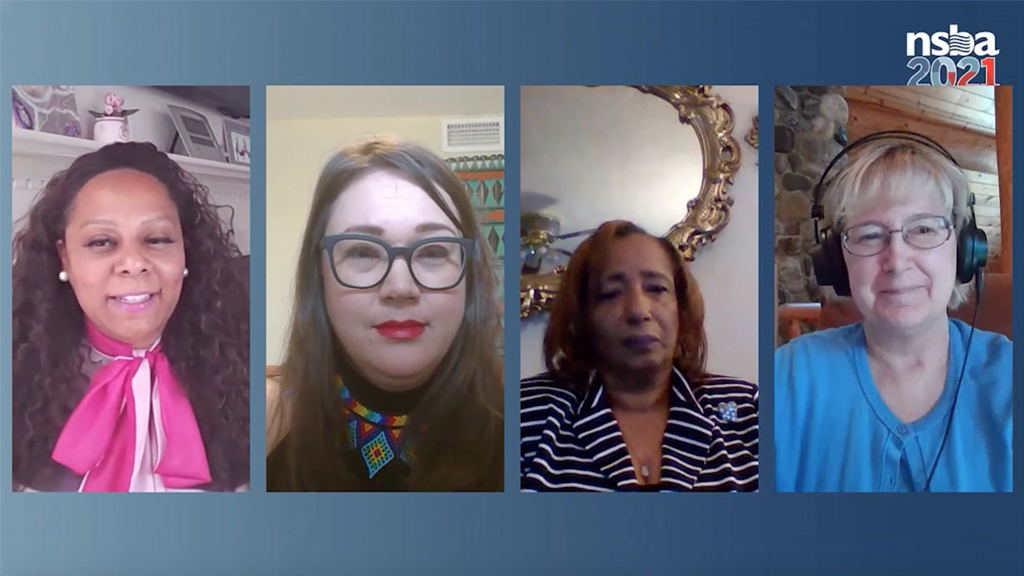
What will it take to dismantle racism in schools? Commitment to hard work, collaboration with allies, learning from those who have made strides, and listening to school community members who are directly affected. These are just some of the recommendations offered by a panel of school board leaders actively engaged in the work during NSBA Online Experience 2021 Thursday.
NSBA launched its Dismantling Institutional Racism in Education (DIRE) initiative in May 2020 to give school board members the tools and training to eradicate racism in schools. “DIRE’s goal is bold, and it is attainable,” said panel moderator Kanisha Williams, NSBA’s managing director of membership and equity services. She is also a member of NSBA’s DIRE team.
Racism is insidious and institutional racism is intentionally created, said panelist Mary Fertakis, an equity consultant who also serves on the Washington State Board of Education. If school board members, state association leaders, educators, and others chip away at it “from our areas of authority and responsibility, the system weakens and will eventually topple.”
It’s important to remember that systemic racism was created “many years ago in order to not educate certain people, in particular black and brown students,” said Ruth Veales, a board member for the Oklahoma City Board of Education, Although there’s been some headway made in moving the needle forward, in fact, “a Band-Aid has been applied. It’s continued in a different way.” Veales was a key advocate in the district’s equity policy being passed unanimously in November 2017.
School board members are in a unique position to move equity efforts forward and dismantle racism through their policy-making responsibilities, said Nikkie Whaley, who serves on Arizona’s Washington Elementary School District. To look at policy through an equity lens, ask questions about who your policies are working for, who do they work against, what are the unmet consequences of these policies, and do the policies work for all students. If not, ask how you can redo them, said Whaley, who also works in board leadership development for the Arizona School Boards Association.
When it comes to institutional racism and the inequities that result, a board’s policies are never neutral, said Fertakis. They do one of four things: exacerbate, perpetuate, mitigate, or eliminate inequities.
Writing policy is a school board’s superpower in advancing equity, Veales said. But she recommended that the district’s legal team be engaged to ensure that equity policy is well defined, compliant, and can live on and continue to be valuable when board members have come and gone.
The Arizona School Boards Association was one of the first in the nation to make equity a part of its strategic plan, noted Whaley. That has helped the association “grow awareness about equity in the state” and “demystify” it. For some, equity is a polarizing word and has resulted in “community backlash” for some school boards in the state, she said. “It’s assumed if we talk about equity, someone is going to lose out. That white students will be left out of the conversation, but that’s not the case.”
Equity is about race and ethnicity, but it also addresses socioeconomic status, the needs of LGBTQ and foster youths, and students living in rural communities, she said. “Our belief is every district in this country has inequities that exist. The goal is to identify those and begin to work to address them.”
Race, of course, is unique, Fertakis said. Among social identifiers such as gender, class, sexual orientation, and physical ability, skin color “has the biggest impact on a person’s lived experience in this country.
“I’m encouraged by the number of people who are willing to lean in and have brave conversations about race in America, regardless of their initial discomfort,” she said. “This is where dismantling institutional racism in education has to start.”

Share this content